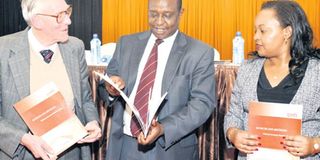Kenya joins top 10 richest African states

From left, KNBS Board Chairman Terry Ryan, Treasury Cabinet Secretary Henry Rotich and his Devolution counterpart Anne Waiguru during the launch of the rebased national accounts statistics at KICC in Nairobi on September 30, 2014. PHOTO | SALATON NJAU |
What you need to know:
- According to the new figures, the country actually achieved a middle income status way back in 2012.
- Some of the goals and objectives of the national blueprint will have to be realigned.
Kenya has moved up four positions to join the top 10 wealthiest economies in Africa.
This was after the Kenya National Bureau of Statistics Bureau (KNBS) on Tuesday released new figures capturing the true value of key sectors such as real estate, telecommunications and manufacturing.
The data shows that major sectors in the economy were grossly underestimated, hence the inaccurate valuation of the economy.
Telecommunications was one of the most undervalued sectors, with the new figures showing its value in 2013 was about 17 per cent bigger than estimated.
Manufacturing, real estate, agriculture and financial services were also inaccurately valued.
The new figures, which have been verified by both the International Monetary Fund and the World Bank, were arrived at after KNBS changed the base year for its calculations from 2001 to 2009.
The exercise, called rebasing, is intended to give an up-to-date picture of the country’s Gross Domestic Product — goods produced and the work done in the economy.
The statistical revision shows that Kenya is 25 per cent wealthier than what was previously thought. It also qualifies Kenya for middle-income status.
“Basically what this exercise yields is an updated picture of the economy, which helps the government to plan well and formulate relevant policies as well as inform investors as they make decisions,” Cabinet Secretary for Devolution and Planning Anne Waiguru said while unveiling the revised economic figures.
According to the new figures, the country actually achieved middle-income status way back in 2012.
Kenya is now ranked the ninth richest country in Africa after overtaking Ethiopia, Tunisia and Ghana, and has expanded its leading margin as the biggest economy in East Africa.
The rates of economic growth have also changed.
The statistical review revealed, for instance, that the country’s economy expanded 5.7 per cent last year, and not 4.7 per cent as KNBS had earlier said.
REALIGN OBJECTIVES
The new outlook will see the government go back to the drawing board with regard to new policies that align to the current status of the economy.
“This is very important as it will inform the development of new taxation measures that are in line with the actual growth of particular sectors. We will now adopt evidence-based policy formulation, monitoring and evaluation,” National Treasury Cabinet Secretary Henry Rotich said.
The government had planned to achieve middle-income status by 2030, which means that some of the goals and objectives of the national blueprint will have to be realigned.
However, there will be no change in the socio-economic status of the common man.
Kenyans will continue grappling with the problems of poor infrastructure, corruption, poor health care, food insecurity and other challenges that have faced the society in the past.
But the government will now be in a better position to plan how to deal with such problems given that it has access to more accurate information.
IMF resident representative Morales Rogelio said the government would need to support developed and emerging economic sectors to stimulate job creation.
“Much more needs to be done to improve the output of the economy for the man in the street to come into terms with this,” Mr Rogelio said.
World Bank senior economist Johan Mistiaen said the country still qualifies for cheaper loans from the institution and other international lenders.
Mr Rotich said the revision gives the country bigger room for more local and international borrowing to fund development, but maintained that the government would be prudent in managing credit.





